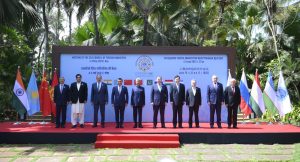On May 4-5, Pakistan’s Foreign Minister Bilawal Bhutto Zardari embarked on a visit to India to attend a Shanghai Cooperation Organization (SCO) meeting, marking the first visit of a Pakistani foreign minister to India in 12 years. Although no notable bilateral progress has been reported thus far, this visit assumed significance as it highlighted Pakistan’s dedication to regionalism. The attendance of Bhutto Zardari was of particular significance for Pakistan given the country’s deteriorating political and economic situation. As a committed member of the SCO since joining in 2017, Pakistan recognizes the important role of regionalism in enhancing security, stability, and economic growth. Therefore, it was imperative for Pakistan to attend the SCO meeting, given its high stake in the organization’s goals, objectives, and activities.
During the visit, Bhutto Zardari held sideline meetings with the foreign ministers of Russia, Uzbekistan, Kyrgyzstan, Kazakhstan, and China. However, there was no significant engagement with his Indian counterpart. Prior to boarding his flight to Goa, where the SCO meeting was held, the Pakistani foreign minister made it clear that the visit would focus solely on the SCO and not include any bilateral talks with India.
Prior to his departure from India, Bhutto Zardari emphasized that the onus was on India to create a suitable environment for dialogue. In an interview with an Indian journalist, he reaffirmed Pakistan’s stance that meaningful engagement with New Delhi cannot occur until India reviews its move to strip the disputed Jammu and Kashmir region of its autonomy in August 2019.
Therefore, the visit cannot be evaluated from a bilateral perspective and can only be viewed in the context of multilateralism. Any progress on bilateral issues would require a conducive environment, which is currently absent.
Pakistan and India have been embroiled in a long-standing rivalry since the Partition in 1947. Despite various efforts to establish peace, non-state actors continue to undermine such efforts. The already strained relationship between the two countries further deteriorated after the Balakot incident in February 2019. The situation escalated when India unilaterally revoked Article 370 and 35A in August 2019, which aggravated the resentment between the two nations. Since then, a “cold peace” has existed between India and Pakistan, with neither side willing to initiate any dialogue. Pakistan believes that India must review its move on Kashmir as a first step toward creating an environment conducive to bilateral talks, while India has shown no interest in engaging with Pakistan under the current circumstances.
During the SCO meeting, Indian External Affairs Minister S. Jaishankar made an undiplomatic remark calling out Bhutto Zardari as the “promoter, justifier, and spokesperson of a terrorism industry.” In response, Bhutto Zardari criticized the weaponization of terrorism for diplomatic gains. These barbs between the foreign ministers illustrate the existing tension and coldness in ties.
However, public pressure from domestic audiences also plays a significant role in hindering progress toward peace between the two countries. With upcoming elections in Pakistan this year and in India next year, neither government is willing to take the first step toward reconciliation, for fear of backlash from their respective domestic audiences. Ahead of elections, anti-India and anti Pakistan narratives are commonly sold in Pakistan and India respectively, in order to appease the voters.
However, despite the current stalemate, it is in the best interest of both countries to work toward peace. Improved relations and mutual trust are essential goals of the SCO, and cannot be achieved without progress between India and Pakistan. Both countries need to address each other’s concerns related to terrorism and the status of Kashmir, respectively.
The region can only prosper and regionalism can prevail if India and Pakistan collectively address mutual issues such as terrorism, extremism, climate change, Kashmir, and water issues. It is imperative for both countries to take a step forward, create a conducive environment, and work toward integrating the region and cooperating with each other. Steps must be taken to promote peace, trust, and cooperation between the two nations. The SCO provides an excellent platform for such engagement, and both countries, in the future, should use this opportunity to pave the way for lasting peace and stability in the region without resorting to unproductive rhetoric.
































